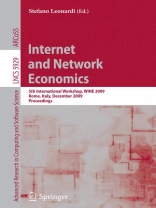This book constitutes the refereed proceedings of the 5th International Workshop on Internet and Network Economics, WINE 2009, held in Rome, Italy, in December 2009.
The 34 regular and 29 short revised full papers presented together with 3 invited talks were carefully reviewed and selected from 142 submissions. The papers address various topics in theoretical computer science, networking and security, economics, mathematics, sociology, and management sciences devoted to the analysis of problems arising in the internet and the worldwide Web, such as auction algorithms, computational advertising, general and majority equilibrium, coalitions, collective action, economics aspects of security and privacy in distributed and network computing, algorithmic design and game theory, information economics, network games, price dynamics, and social networks.
สารบัญ
Invited Talks.- Ad Exchanges: Research Issues.- Adaptive Learning in Systems of Interacting Agents.- Quantifying Outcomes in Games.- Regular Papers.- Competitive Routing over Time.- On 2-Player Randomized Mechanisms for Scheduling.- On Stackelberg Pricing with Computationally Bounded Consumers.- On Best Response Dynamics in Weighted Congestion Games with Polynomial Delays.- Parametric Packing of Selfish Items and the Subset Sum Algorithm.- An Online Multi-unit Auction with Improved Competitive Ratio.- Prediction Mechanisms That Do Not Incentivize Undesirable Actions.- Pricing Strategies for Viral Marketing on Social Networks.- Consistent Continuous Trust-Based Recommendation Systems.- The Stackelberg Minimum Spanning Tree Game on Planar and Bounded-Treewidth Graphs.- Tighter Bounds for Facility Games.- Degrees of Guaranteed Envy-Freeness in Finite Bounded Cake-Cutting Protocols.- Approximate Pure Nash Equilibria via Lovász Local Lemma.- Externalities in Keyword Auctions: An Empirical and Theoretical Assessment.- Covering Games: Approximation through Non-cooperation.- Contract Auctions for Sponsored Search.- Bidding for Representative Allocations for Display Advertising.- Social Networks and Stable Matchings in the Job Market.- Maximizing the Minimum Load: The Cost of Selfishness.- Competitive Repeated Allocation without Payments.- Pseudonyms in Cost-Sharing Games.- Computing Optimal Contracts in Series-Parallel Heterogeneous Combinatorial Agencies.- Nash Equilibria for Voronoi Games on Transitive Graphs.- Selfish Scheduling with Setup Times.- Computational Aspects of Multimarket Price Wars.- The Impact of Social Ignorance on Weighted Congestion Games.- The Complexity of Models of International Trade.- The Geometry of Truthfulness.- Optimal Incentives for Participation with Type-Dependent Externalities.- Nash Dynamics in Congestion Games with Similar Resources.- Online Ad Assignment with Free Disposal.- Truthful and Quality Conscious Query Incentive Networks.- An Analysis of Troubled Assets Reverse Auction.- Direction Preserving Zero Point Computing and Applications.- Short Papers.- Continuity Properties of Equilibria in Some Fisher and Arrow-Debreu Market Models.- Route Distribution Incentives.- Wiretapping a Hidden Network.- Refining the Cost of Cheap Labor in Set System Auctions.- On the Power of Mediators.- Strong Nash Equilibria in Games with the Lexicographical Improvement Property.- A Note on Strictly Competitive Games.- The Efficiency of Fair Division.- Sequential Bidding in the Bailey-Cavallo Mechanism.- Subsidized Prediction Markets for Risk Averse Traders.- Envy, Multi Envy, and Revenue Maximization.- Nudging Mechanisms for Technology Adoption.- Mechanism Design for Complexity-Constrained Bidders.- Priority Right Auction for Komi Setting.- Randomized Online Algorithms for the Buyback Problem.- Envy-Free Allocations for Budgeted Bidders.- On the Inefficiency Ratio of Stable Equilibria in Congestion Games.- Betting on the Real Line.- Characterization of Strategy-Proof, Revenue Monotone Combinatorial Auction Mechanisms and Connection with False-Name-Proofness.- 2D-TUCKER Is PPAD-Complete.- Bidder Optimal Assignments for General Utilities.- A New Ranking Scheme of the GSP Mechanism with Markovian Users.- Mediated Equilibria in Load-Balancing Games.- On the Impact of Strategy and Utility Structures on Congestion-Averse Games.- On Strong Equilibria in the Max Cut Game.- Stability and Convergence in Selfish Scheduling with Altruistic Agents.- Gaming Dynamic Parimutuel Markets.- News Posting by Strategic Users in a Social Network.- Erratum.- Erratum to: Prediction Mechanisms That Do Not Incentivize Undesirable Actions.












